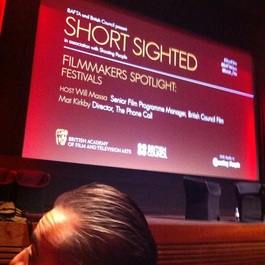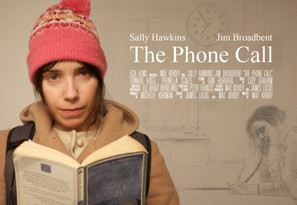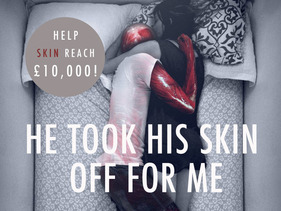
On the rise in our demanding online society is short film. It’s as though cinema and movie lovers, with the exception of critics and film obsessive’s (we’re a special breed), are suffering from collective ADHD despite the resurging trend in movies dragging out compact stories over three hours (this is all another article for another time.) Our hands are permanently locked on our phones which isn’t necessarily a bad thing because now we have this immediate access to talent, art and information. Our train or bus journeys are happily absorbed in screens and social media, fiddling with Buzzfeed and swiping onto the next article. All of which budding filmmakers can thoroughly abuse, in the best sense, and plug their evocative or hilarious shorts to a wider mainstream audience.
And this weekend, BAFTA alongside Shooting People gave an amazing event on how to market your short, to a new, varied and over saturated market.

Chaired by Briony Hanson, the Director of Film for the British Council, this hour session focused on shorts that circulate the film festivals yearly. Guests on the panel were; Philip Ilson, the director of the London Short Film Festival and Short Film Programmer for London Film Festival; Sven Schwarz, Managing Director for Hamburg International Short Film Festival and Gaia Meucci the Short Film Curator at Encounters Short Film Festival.
Though each festival director and consequently it’s festival has a different flare, a personality ranging from the weird and experimental to the dramas and comedies, it is clear that the workload for the producers is heavy. Shockingly, the teams are small and the market for short films are vast and plentiful. Ranging from 1500 (LFF) to 6,000 (Hamburg) entries to sift through, it’s clear that your film needs to stick out and engage. Most festivals now are purely online submissions too, so bribery with fancy DVD boxes and press packages are dwindling (and it doesn’t work anyway.) The general message was to be mindful of what the festival is about. Read their entry forms and terms thoroughly whilst also working out whether your film will fit in and whether it is worth it. Also be aware that with such a vast array of films being sent through daily and a small number being selected that even if your film wasn’t accepted, don’t be disheartened. Keep going as there is a wide number of short film festivals to apply to (listed here).

And to hammer this point home, successful director Mat Kirkby talks to us about how he attacked the festival circuit with his phenomenal short The Phone Call, now hotly tipped for an Oscar nomination. Interviewed by Senior Film Programme Manager for British Council, Will Masa (who chaired this entire event) this was a joyful exploration of one director’s success. One of the most hilarious directors that has tidbits of knowledge to share, Kirkby spoke about how he applied to 60 festivals before being accepted and how the project took years to do (he’d waited around for lead Sally Hawkins as she built her career with Blue Jasmine). Wittily, Kirkby mentions how difficult but rewarding it is. It took time, an agent and determination. And it has paid off – reaping the rewards at Tribeca (where his film won) and gaining much more attention and wins. Again, proof that despite people saying no – there will be someone who says yes. (If you do get a chance to check out the film, do, it was screened and it is brilliant).

Art and finance go hand in hand yet artists and business do not. Whilst some people (who’ll we talk about later on) do possess that talent of enthralling people to send over money, others don’t. Which is where people like Derry O’Brien, Managing Director of Network Ireland Television and Chris Tide, Vice President of Global Acquisitions for Shorts International. The brilliance of this talk was to understand the selling side of film and cinema. Though you can do this solely by yourself, you can hire agents who do work on short film (there is a bigger community out there than you realise). In charge with bringing your work to televisions, festivals and more, these two imparted advice on standing out and making something different, otherwise they’ll not pick it up. They too get sent loads of films on a daily basis so it’s important to be fresh and unique as well as making sure you adhere to contracts. Knowing that there are people who could pick up your work and do the financial aspect of marketing for you, was helpful.

Hosted by the effervescent James Mullighan, Director for Cork Film Festival, Katie Steed from Whirlygig Cinema, Katharine Round from DocHeads and Silvija Duoblyte from Future Shorts discussed the new ventures in short film screenings. Rather than looking at the high profiled events, this talk really focused on building an networking through the new festivals and monthly screenings that are vital to filmmakers (it’s a foe but networking is so important). As they discussed the difference of their events, they all really aid the new and emerging talent. You can not only get immediate feedback from the audience, but there is nothing better than seeing your film on the big screen!
Online OpportunitiesDistrify and Fliqio
This may come as a shock to many but there are more ways than festivals and screenings to monetise your film and get it to a wider audience. The change in the way we are evolving and working online to get audiences interacting with our work is paramount to monetizing shorts. Speakers from Distrify and Fliqio were very wary that it all relies on the audience and that successful shorts, for example Sea Wall with Andrew Scott, work on knowing the market and adapting your campaign it.

With every filmmaker and their son turning to websites such as Kickstarter and IndieGoGo, successful director Ben Aston and the team behind He Took His Skin Off For Me. This was the inspiring talk of the day, in my opinion. Whilst there were finer talks about his film (which we will definitely talk about at a later date), Aston has the most levelled and aware minds-et as a director trying to communicate with people in order for them to give him money. Aware that backers were interest more about the person behind the film rather than the rewards they get, Aston made sure that they were catered to by talking to them after they had donated. He also advised that Kickstarter is a community of filmmakers, and therefore if you back another project, you’re more likely to get a response back for your film. Though he had fun doing so, this promising filmmaker mentioned that the whole process became a full time job in which took chunks from his time. Ending on the note that Kickstarter should only be used once, Aston set fires in the bellies of many attending as he peeled back the intricacies of crowd-funding.

More importantly, it’s a lot of hard work, with many short film makers taking on the plugging on social media and marketing like a full time job. However, if you have that passion, the drive and the determination, you could do it. And it’ll be beautiful, vital and poignant.

 RSS Feed
RSS Feed
